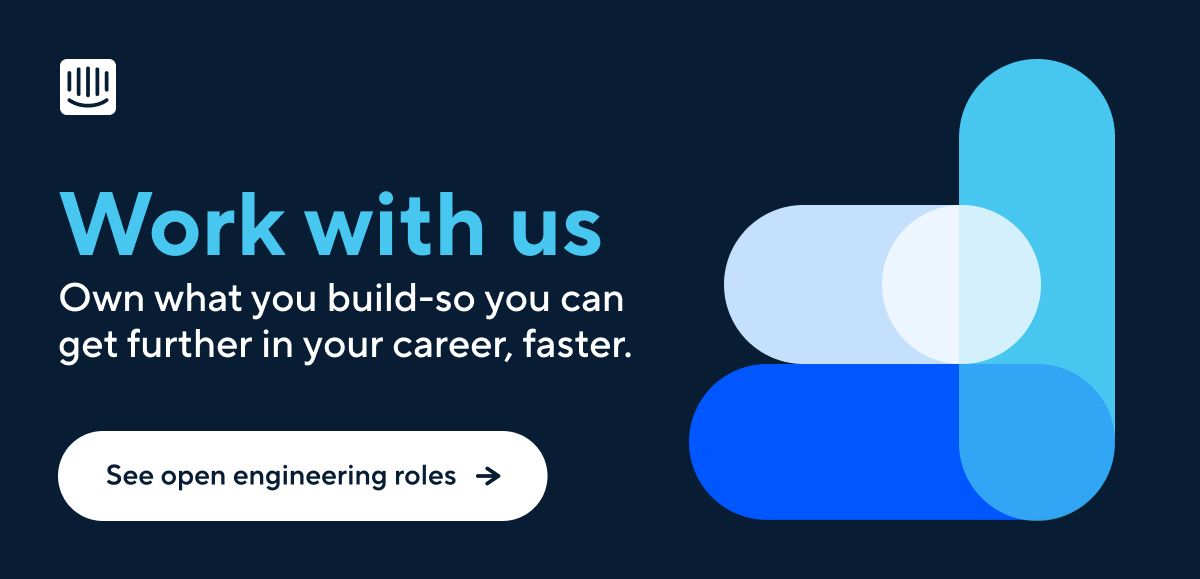
Engineering at Intercom: Highlights from my first two years
Main illustration: Simone Noronha
One of the joys of an engineering career is how varied it can be – the size, industry and above all culture of any company entirely determines what an engineering job actually looks like on a day to day basis.
But that variety also brings a challenge – when considering engineering job opportunities, how do you know what you’ll actually be doing? Two roles at similar levels in similar looking companies can actually differ widely in practice. Too often, the details of your work, and the opportunity for growth, satisfaction and enjoyment can be hard to gauge just by looking at the job spec.
So here I’m going to describe my first two years here so you can get a sense of what engineering work at Intercom actually looks like – how do we approach problems, how do we collaborate, how do we build product, how do we treat one another.
Joining Intercom
I’ve been a Product Engineer at Intercom for just over two years. I’d previously worked as an engineer with Squad, an Indian startup. Within four years there, we grew from 10 to 100 people and I progressed from being an intern to leading the Engineering team. Coming to Intercom, I was keen to have an impact straight away, and see real results from my input – my time at a startup meant that I was used to working quickly and effectively.
“Intercom felt like a good choice because it was at just the right stage”
Intercom felt like a good choice because it was at just the right stage. The company had passed its initial startup phase and was (and still is!) in a period of rapid growth, with exciting new challenges and problems to solve. It had established solid processes and ways of working, but still exhibited the flexibility, adaptability, and speed of a young company.
Onboarding with Intercom
The onboarding experience was so supportive. I’d just moved from India, and my managers made sure that I settled into Intercom, and Ireland, without having to stress about getting to grips with a new job in the first few weeks. As part of onboarding I was assigned a buddy who I could ask questions about my work, or the company in general, and my teammates were always there to help. That cushion was so important as I adjusted to the huge change of relocating from India, and gaining context about Intercom and its product.
“I quickly began to feel more confident to pitch in with my thoughts and suggest changes to direction”
Coming from a smaller startup, I was used to having an immediate and company-wide impact, and making important product and technology decisions. It was a little disconcerting not to be able to contribute to the same level at Intercom right away, but the feeling soon passed as I gained more context about my team’s ownership areas, and the company as a whole. I quickly began to feel more confident to pitch in with my thoughts and suggest changes to direction. Intercom allowed me to take the time I needed to gain an understanding of the product and the processes we use to build it – as a result, I was able to contribute in a more valuable and effective way.
My Intercom journey so far
For my first year, I worked with the Billing team. I enjoy reading and learning about system design, so billing was an interesting space, and gave me the opportunity to work closely with our Sales team and tackle some fascinating problems.
I have since moved to the Core Technologies team, a group of specialists with expertise in the core technologies that Intercom uses – MySQL, Ruby, Rails, and Elasticsearch, to name a few. After a great year with Team Billing, I was keen to work more closely with databases, and was given an opportunity to become an Elasticsearch specialist with Team Core Technologies. There are so many opportunities like this at Intercom – trying out new things and learning new skills is heavily encouraged, and my move was wholly supported by my manager. The company is open to working with you to achieve the best outcome for both you and the business, and that means allowing every employee to develop their careers.
What makes Intercom “Intercom”?
Reflecting on my experience, I’ve pulled together a non-exhaustive list of the things that make Intercom’s culture unique. I’ve encountered elements of this list on other engineering teams, but Intercom has achieved a unique balance when it comes to company culture that’s helped me to learn quickly and reach new stages of development. Here are just a few of the things I love about Intercom that I think would help any engineering team to grow and scale sustainably:
Start with a cupcake
We place a lot of emphasis on learning from production as quickly as possible – starting with small chunks of work and building on them as we go. This is not a unique perspective, but it is so easy to overlook. We call it starting with a cupcake.
This approach applies to both Product and Engineering, and “think big, start small, learn fast” is one of our R&D principles. I wrote a blog post about the engineering aspect of it a while ago, and every time I see this principle in action or use it myself, I am amazed at how well it works.
Choose boring technology
It can be tempting to try to solve every problem with an exciting solution, but introducing unnecessary complexity can create issues down the line. At Intercom, when we talk about boring tech, we mean tech that is “easy to understand, familiar, and uneventful.” We build innovative solutions using technology that we and our customers understand.
“We choose boring technology as long as it is the right tradeoff. If it isn’t, we don’t shy away from building sophisticated systems that suit our needs”
This doesn’t mean we always use off-the-shelf solutions. We choose boring technology as long as it is the right tradeoff. If it isn’t, we don’t shy away from building sophisticated systems that suit our needs. Our MySQL sharding system and Elasticsearch Cloud come to mind as examples. Even with these sophisticated systems, though, we will try to use a boring technology as the foundation for as long as we can.
Implement lean processes
Processes are hard to get right – a balance has to be established between speed and correctness. I have seen smaller startups that lean on the side of too many processes (often following the example of larger companies) and become slow, losing their edge on competitors. And I’ve seen startups with too few processes, where things seem to move fast but there is no way for new members to trace a decision to its origin, learn from mistakes, or repeat successes.
“Intercom’s push for lean processes isn’t an accident. Everyone at Intercom is intentional about moving fast”
Intercom’s push for lean processes isn’t an accident. Everyone at Intercom is intentional about moving fast. The leadership team spends time thinking about processes, making sure they listen to the talented folks they have hired, and setting them up for success. The engineers consistently evaluate how best to ship changes with speed and safety by following simple best practices.
Keep it simple
I’ve thrived within Intercom’s culture of keeping things simple. The teams are small, focused primarily on a part of the product which they own completely. It’s up to each team how they work, but all follow a set of principles, and cultivate a “principles over processes” approach among teammates.
Our standups are a good place to gain context on what everyone on the team is doing, and to help unblock each other if needed. These standups have become even more important while working remotely – they mean I get to see my team everyday, and don’t miss out on important context.
Reward kindness
Over the last two years, I’ve gotten to work with a lot of domain experts: Technical Program Managers, Engineers, Sales Representatives, Finance Operations Managers, Editors. And one thing stands out: they’ve all been such good, kind humans. Intercom has introduced me to experienced people who are always willing to help and show you the right way without making you feel stupid. There is this general feeling that people want the best for you.
“I have regular meetings set up with experienced engineering mentors who can guide me through team changes, or share insights from their experience”
Engineers onboarding to the company, or to a team, work closely with a “buddy” who helps them to become a productive member of the team and start creating impact as soon as possible. On top of that, everybody is happy to jump on a call to explain a concept you are having trouble with, or share context about a system that you are working on. I have regular meetings set up with experienced engineering mentors who can guide me through team changes, or share insights from their experience.
This environment is hard to replicate, but a company’s culture is built from the behaviors people are rewarded for. Intercom rewards people for having outsized impact – that impact could be related to their work, or to the way they relate to the people they work with.
My future at Intercom
I have learnt a lot in the last two years, and my experience so far has made me even more excited about my future here. There is so much more for me to experience here and I feel that starting with Intercom, and moving to Ireland, has put me on the next S curve of growth, both professionally and personally.








